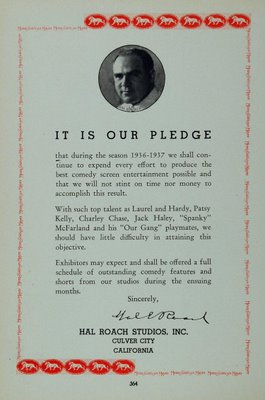 Interesting ad. Optimistic ad.
Interesting ad. Optimistic ad.
You can click on the picture above to read this trade ad for The Hal Roach Studio for yourself, but it’s the first line that’s important: “It is our pledge that during the season 1936-1937 we shall continue to expend every effort to produce the best comedy screen entertainment possible and that we will not stint on time nor money to accomplish this result.”
You have to feel bad for Hal Roach during this period. He tried to live up to his pledge. He succeeded in spots (Topper was a ‘37 release) but in many places he just couldn’t attain his vision for ‘36-’37.
Laurel and Hardy made made no short subjects after 1935, which is a shame. In ‘36 they released Our Relations, and in ‘37, Way Out West. You’d have to say that – even without the shorts – Roach made good on his pledge here.
Patsy Kelly made four short subjects with two different co-stars in ‘36 following the death of Thelma Todd; but the series was kaput. Patsy also co-starred with Charley Chase in a feature, Kelly The Second, but time- and money-stinting is in evidence. Roach couldn’t live up to the pledge here.
Charley Chase’s own first starring feature, Neighborhood House, was judged unsuccessful and was cut down and released as a mere two-reeler in 1936. It turned out to be Charley’s last film for Roach. He did make 6 two-reelers in ‘37… but for Columbia. Pledge not honored.
Jack Haley appeared in two features for Roach, Mr. Cinderella in ‘36 and Pick A Star in ‘37. He wasn’t around long enough to become a Roach regular. He returned to 20th Century Fox in ‘37. Pledge? Haley? What pledge?
“Spanky McFarland and his Our Gang playmates” made a ‘36 feature, General Spanky, which flopped, and Roach started producing the previously two-reel Our Gangs as one reel subjects. Roach gave up on the Gang in ‘38, selling the series to MGM, which made some pretty terrible entries. Some good shorts in the final Roach years, however, and while length decreased, time and money was expended to keep the series going. Give this one to Hal.
It makes you wonder if Roach felt he needed to bolster his studio’s image through the trade “pledge” ad specifically because he faced an uncertain season. The glory days of the studio as producer of sound short subjects essentially ended during these years, and, with occasional exceptions, the Roach Studio did not succeed in features.